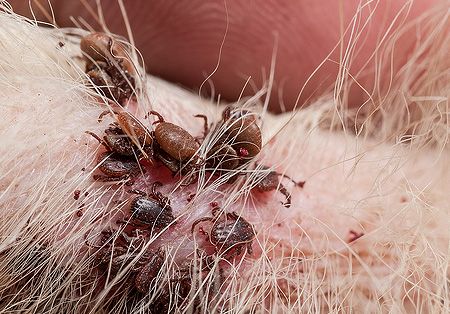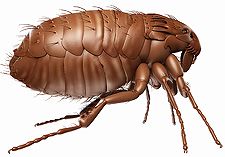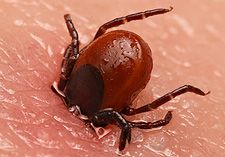AND MITES CAN PARASITE:
- Fleas (cat flea Ctenocephalides felis and dog flea Ctenocephalides canis).
- Lice (dog lice Linognathus setosus, chewing lice Felicola subrostrata).
- Mallophaga (dog mallophaga Trichodectes canis).
- The scabies (Sarcoptes scabiei, świerzbowiec uszny Otodectes cynotis, świerzbowiec głowowy kotów Notoedres cati).
- Demodex folliculorum (Demodex spp.).
- Ticks (Ixodes spp., Rhipicephalus sanguineus, Dermacentor reticulatus).
- Dermatological, resulting in damage or skin irritation, local or systemic inflammation due to insect bites, skin appendages inflammation, allergy, secondary bacterial infections leading to superficial or sometimes deep pyoderma.
- Damage to hearing.
- Loss of hair coat in the form of local changes or generalized.
- Changes in the behavior of animals that are becoming more restless and excitable.
- Peripheral nerve paralysis due to a toxin (tick paralysis).
With strong invasion of fleas and ticks, feeding on the blood of puppies and kittens, can lead to significant blood loss leading to anemia.
Some parasites can be transmitted from animals to humans ( eg. Mites Sarcoptes scabiei and Notoedres cati) causing serious skin diseases. Others are vectors carrying the germs (bacteria, viruses, parasites) of many serious human and animal diseases.
In dogs and cats the most commonly encountered is cat flea (Ctenocephalides felis), which also infects humans. Fleas besides that they cause severe irritation of the skin, leading to allergic dermatitis (FAD – flea allergic dermatitis) can be a source of diseases caused by bacteria and parasites:
- Dipylydioza – Taeniasis (Dipylidium caninum) occurs in humans as zoonosis.
- Yersiniosis (Yersinia enterocolityca, Yersinia pestis). Fleas are the primary vector of the plague bacteria – Yersinia.
- Leishmaniasis (Leishmania spp.). The disease seen in dogs and humans. In animals revealed a change in behavior, muscle atrophy, weight loss – not treated leads to death of the animal.
- Cat scratch disease (CSD, Bartonella henselae), in clinical form occurs most often in people (children, feline breeders, veterinarians), is characterized by inflammation of the skin at the site of scratching and inflammation of the lymph nodes (local or generalized).
Fleas can also participate in the transmission of tapeworms in both humans and dogs and cats.
Ticks are parasites on the skin of humans and animals. Occur almost in any environment (forests, meadows, in parks, in front gardens) dwelling on the grass or low bushes. In Poland, there are 3 basic types of ticks:
Ixodes ricinus, known as forest tick. It is present in countries with cold climates (Europe, Russia, Central Asia, North America, Japan). Infects humans, dogs, cats, cattle and rodents. It is the source of: borreliosis (Lyme disease), cattle babesiosis, ehrlichiosis and bartonellosis.
Dermacentor reticulatus exists in forests, parks, the bushes of household, in the dark and damp places. Exists in the zone of cold and moderate climate, among others, in Europe. Infects humans, dogs and small rodents. Is the source of babesiosis.
Rhipicephalus sanguineus is called the dog tick, which adapted to the dry and hot climate. In its development is distinguished by 3 hosts, but the main hosts are carnivores. It is a source of babesiosis, ehrlichiosis, hepatozoonosis, rickettsiosis, haemobartonella.
Ticks carry diseases caused by bacteria, viruses and parasites.
To infect their host tick must first locate him, stick to his skin and start drinking blood. Drinking the blood takes place in two phases: a slow and rapid. The greatest risk of transmission of pathogenic microorganisms are present in the second, rapid phase of drinking blood (within 24-48 hour feeding). The tick gets rid of the excess fluid collected with the blood introducing them into the wound of a host. The fluid may contain various pathogenic microorganisms. Very often, in the case of parasitic ticks on the skin for over 24-48 hours, the transmission of diseases is provoked by the wrong way of removing them.




